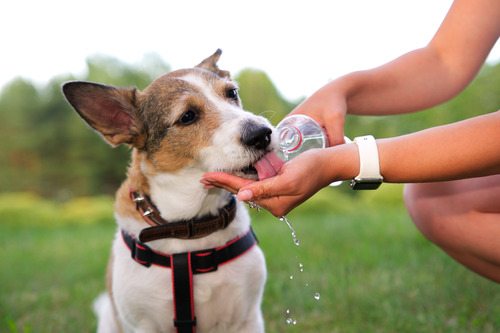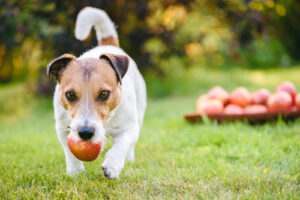Dogs rely on proper hydration for their health and energy, just like people do. When the body loses more fluids than it takes in, dog dehydration occurs, which can affect organ function, digestion, circulation, and overall comfort. Dehydration may seem like something that only happens on hot summer days, but it can affect dogs year-round. This blog will educate you on the causes, recognizing the signs, and taking preventive steps, so you can better protect your pet’s well-being. If you’re concerned about dog dehydration in your pet, Boulder Veterinary Hospital in Boulder, CO, is here to help. Call (303) 442-6262 or book an appointment online today.
Causes of Dehydration in Dogs
Several factors can contribute to dog dehydration, ranging from environmental conditions to underlying health concerns.
Heat and Weather Conditions
Hot temperatures, high humidity, and extended sun exposure can increase the risk of dehydration in dogs. Dogs do not sweat the way humans do, so they rely heavily on panting to regulate body temperature. During extreme heat, panting may not be enough to cool them, leading to excessive fluid loss.
Physical Activity
Energetic dogs that run, hike, or play for long periods can become dehydrated if they are not given frequent water breaks. Outdoor activities, especially in Boulder’s dry climate and higher elevation, can cause dogs to lose fluids faster than expected.
Illness and Health Issues
Certain health conditions, such as kidney disease, diabetes, vomiting, or diarrhea, can contribute to fluid loss and make dehydration more likely. Dogs recovering from illness or surgery may also be more vulnerable.
Limited Access to Fresh Water
Sometimes dehydration results from something as simple as not having clean, accessible water available. Dogs should always have a constant supply of fresh water at home, during travel, and while outdoors.
What Are the Signs of Dog Dehydration?
Recognizing the signs of dog dehydration early can help you seek veterinary attention before the condition becomes severe. While the severity may vary, any of the following changes can be concerning:
Changes in Behavior and Energy
Dehydrated dogs may seem more tired than usual, uninterested in play, or less responsive to their surroundings. A sudden drop in energy or enthusiasm can be an early warning sign.
Loss of Appetite
When dogs are dehydrated, they often lose interest in eating. If your dog skips meals and shows other concerning symptoms, dehydration could be the reason.
Dry Nose, Gums, and Mouth
Moisture in a dog’s mouth and nose helps indicate proper hydration. If you notice dry gums, sticky saliva, or a nose that feels unusually dry, dehydration may be the cause.
Panting and Rapid Breathing
Panting is normal, but when paired with drooling, fast breathing, or signs of distress, it can signal excessive fluid loss.
Reduced Skin Elasticity
A common test for dog dehydration involves gently pulling up on the skin at the back of the neck or between the shoulder blades. In a well-hydrated dog, the skin quickly returns to place. In a dehydrated dog, it may take longer to settle back.
Addressing Dog Dehydration
If you suspect dog dehydration, contacting your veterinarian right away is the safest step. At Boulder Veterinary Hospital, our team evaluates hydration levels and recommends treatment tailored to your dog’s condition.
- Veterinary Evaluation: A physical exam and, if needed, diagnostic tests help determine how dehydrated your dog is and whether an underlying issue is contributing. Identifying the cause is important for effective treatment.
- Fluid Therapy: Veterinarians often provide fluids to rehydrate dogs. This may be done in-clinic, depending on the severity, to restore fluid balance and improve circulation.
- Monitoring Recovery: Dehydrated dogs require monitoring to make sure they respond to treatment. Your veterinarian may check vital signs, hydration levels, and overall comfort throughout the process.
Tips for Preventing Dehydration in Dogs
Prevention is the best way to protect your dog from dehydration. A few simple habits can greatly reduce the risk.
Provide Fresh Water at All Times
Dogs need constant access to clean, cool water. Make it a routine to refresh their bowl daily and bring water with you whenever you leave home with your dog.
Plan Ahead for Exercise and Outdoor Activities
If your dog enjoys long walks, hikes, or runs, take breaks often and offer water frequently. During the summer, schedule exercise for cooler parts of the day, such as early morning or evening.
Watch the Weather
High temperatures, direct sunlight, and low humidity increase dehydration risk. On very hot days, keep outdoor time short and provide shaded rest areas.
Support Dogs with Health Conditions
If your dog has a condition that makes dehydration more likely, your veterinarian may recommend additional checkups or management strategies. Stay alert to changes in appetite, energy, and bathroom habits.
When It’s Time to Contact Boulder Veterinary Hospital
Dehydration in dogs can range from mild to life-threatening, depending on the cause and how quickly it is addressed. If you notice any warning signs, the best step is to schedule an appointment with your veterinarian. Boulder Veterinary Hospital provides advanced care for pets in Boulder, CO. If you are concerned about dog dehydration, call (303) 442-6262 or book an appointment online. Acting quickly gives your dog the best chance to recover comfortably and return to their happy, healthy self.





